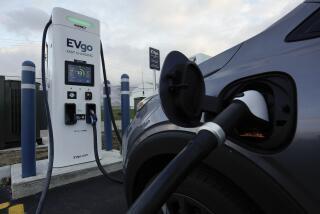Is now a good time to buy a car? Here’s what experts say
To buy or not to buy? That is the question facing many car shoppers these days.
That’s because rising gas expenses and a looming shortage of Japanese-built hybrid and fuel-efficient vehicles are starting to pump up prices for gas-sipping autos.
But analysts at auto information company Kelley Blue Book say that with all this turmoil in the marketplace, consumers should think twice about jumping to buy a new car.
They say it’s a mistake to pay a premium for a fuel-efficient car when gas prices could easily drop in the coming months and the price of the vehicles come back down.
Likewise, the earthquake in Japan has upended auto production, with both Toyota and Honda having closed factories there temporarily. But they will probably be back up in weeks or several months, and inventories could rise soon thereafter.
“Don’t run into the marketplace and purchase a new vehicle unless you absolutely have to. Wait for gas prices to come down and the Japanese earthquake to no longer be an issue,” said Juan Flores, director of vehicle valuation for Kelley Blue Book.
Flores notes that crude oil is abundant. Prices are up because oil traders are nervous about the political instability in the Middle East and Persian Gulf rather than because of a surge in demand or shortage. “These fuel prices are not sustainable,” he said.
Kelley Blue Book foresees “soft” prices for small and hybrid cars two to three years out, he said.
But other analysts aren’t so sure.
With the possible exception of the Toyota Prius hybrid, “I cannot imagine a scenario where there will be more cars to choose from or lower prices months from now than what we have now,” said Jeremy Anwyl, chief executive of auto information company Edmunds.com.
Current sales incentives being offered by manufacturers run through the end of the month. Consumers might as well take advantage of them because the deals might not be as good next month, he said.
There could be an upside to buying now. “If the supply of cars is disrupted, dealer pricing would firm up, incentives would go down, and you will have more limited options, such as not being able to get the color you want,” Anwyl said.
Milton Olin, an attorney from Woodland Hills, watched the world events unfold and decided to lease a new Prius from Toyota Scion of Santa Monica last week.
“With gas prices going up and my sense that the Japanese industry would be disrupted by the earthquake and tsunami and radioactive concerns, I thought that prices had nowhere to go but up,” Olin said. “I think that fuel prices will inch their way up too even if they back down for a little bit.”
High gas prices also were enough to get Bruce Stryd, a pastor in Fremont, Calif., to replace an aging Ford Explorer that got just 12 miles per gallon with a Mazda3 hatchback with nearly double the fuel efficiency this week.
“My sense is that it is a good time to buy a car,” he said. “There are still a lot of incentives out there, and the dealers seem like they really want to move the vehicles. The fuel issue isn’t going to turn around. Prices will keep going up.”
Jim Francis of Sterling, Va., made a similar decision during the gasoline price spike of 2008, paying $26,000 for a Prius to replace an aging Nissan.
He said gas prices then fell from their highs. He also missed out on the last year of attractive incentives and deals for the Prius, a result of Toyota’s efforts to maintain U.S. market share in the face of millions of vehicle recalls that have damaged the brand.
But three years after his purchase, Francis doesn’t regret his decision. It’s worked out in the long run.
“It is not totally about the dollars. It is an environmental thing, a feel-good thing. Still, it’s been nice to fill up once every two weeks for the past several years when you have a 50-mile commute,” Francis said.
Francis and Stryd are pretty typical consumers, Anwyl said.
“Most people are not making decisions based on what they think pricing or availability will be two or three months from now. People are asking these bigger questions now only because of all these events playing out on the world stage,” he said.
Figuring out the effect of the Japanese earthquake on the U.S auto market could take weeks, and possibly longer. And divining what’s ahead for gas prices is even more difficult.
“There is no doubt that the price of gasoline is out of whack with the current supply that we have,” said Phil Flynn, an oil analyst with PFGBest Research in Chicago.
Gas could quickly slide back toward $2 a gallon if political stability returned to the Middle East, he said. Crude oil supplies are at close to a record high for this time of year.
Still, Flynn said, the political upheavals in the Middle East create “historic risks to the price of petroleum unlike any we have seen in many decades.”







